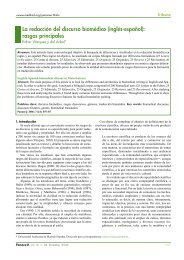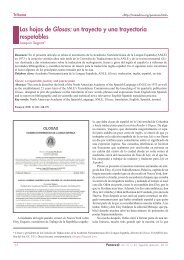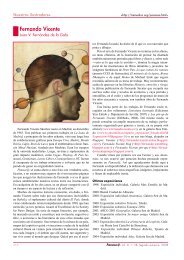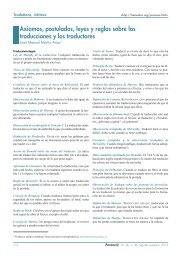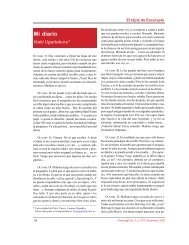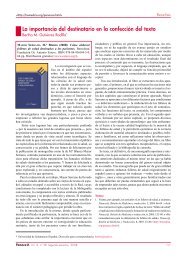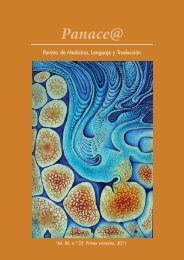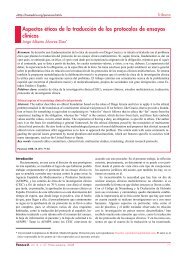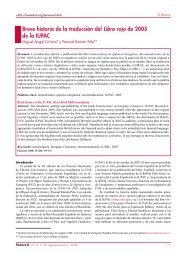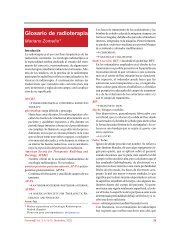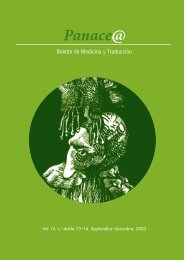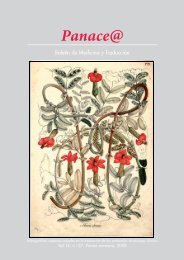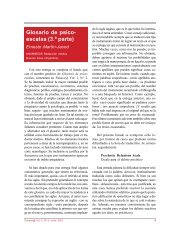Phraseological units: Their instantial use and interpretation
Phraseological units: Their instantial use and interpretation
Phraseological units: Their instantial use and interpretation
Create successful ePaper yourself
Turn your PDF publications into a flip-book with our unique Google optimized e-Paper software.
Reseñastranslated into Spanish: “Rey de los gatos, sólo quiero una detus siete vidas y luego aporrearte a palos las otras seis.”(Shakespeare, 1967: 637.)4. Descartes’ text appears in the following context: “Le bon sensest la chose du monde la mieux partagée: car chascun pense enêtre si bien pourvû, que ceux mesme qui sont les plus difficilesà contenter en toute autre chose, n’ont point costume d’en desirerplus qu’ils ont.”5. See, for instance, the following text from Hobbes (1950: 101-102): “And as to the faculties of the mind [...], I find yet agreater equality amongst men [...]. For there is not ordinarily agreater signe of the equall distribution of any thing, than thatevery man is contented with his share.”6. We disregard the other alternative <strong>interpretation</strong>s of Descartes’text, particularly the one that “reads” a Cartesian irony in thistext.7. Montaigne’s text appears in the following context: “On ditcommunément que le plus juste partage que nature nous ayefait de ses graces, c’est celui du sens: car il n’est aucun qui nese contente de ce qu’elle lui a distribué.”8. For a further analysis of this topic, see Chamizo Domínguez(1988: 63-65).9. Classic literature <strong>and</strong> philosophy provide lots of examples ofphraseological <strong>units</strong>, that have entered modern languages <strong>and</strong>that are widely <strong>use</strong>d in an <strong>instantial</strong> sense. For instance:“Timeo Danaos et dona ferentes,” “Varium et mutabile semperfemina,” or “Fides punica.”10. The context of the quote is the following: “‘Realize thyself,Amœba dear’, said Will: <strong>and</strong> Amœba realized herself, <strong>and</strong>there was no Small Change but many Checks on the Bankwherein the wild Time grew <strong>and</strong> grew <strong>and</strong> grew.” It has beentranslated into Spanish as “‘Imagínate a ti misma, queridaAmeba’, dijo Will: y la Ameba se imaginó a sí misma, y nohubo ningún Pequeño Cambio sino muchos Cheques sobre elBanco donde el Tiempo salvaje crecía y crecía y crecía.” (Ogden& Richards, 1964: 310). For a fuller analysis of this text<strong>and</strong> its problems in Spanish translation, see ChamizoDomínguez (1999: 39-42).11. This hypothesis is backed by the OED. Dutch 4: “Characteristicof or attributed to the Dutch; often with an opprobrious orderisive application, largely due to the rivalry <strong>and</strong> enmity betweenthe English <strong>and</strong> Dutch in the 17th c.”12. This kind of derogatory ethnic slur can be found anywhere <strong>and</strong>in any language. For instance, French “Parler français commeune vache espagnole,” means “to speak bad French.” And, curiouslyenough, this current phraseological unit derives froman erroneous quote of “Parler français comme une Basque espagnole.”13. The word ”Dutch” is widely <strong>use</strong>d in English in a derogatoryway. The OED also lists: ”Dutch party/supper/lunch/treat”(“one at which each person contributes his or her own share”);”double Dutch” (“a language that one does not underst<strong>and</strong>”);“in Dutch” (“in disfavor, in disgrace, or trouble”); “to do a/theDutch (act)” (“to desert, escape, run away; also, to commit suicide”);<strong>and</strong> many more.14. According to a personal communication from Gerald Steen (VrijeUniversiteit, Amsterdam), “The Dutch adjective for ‘English’(Engels) is neutrally descriptive of a particular class of items,which apparently all seem to come from Engl<strong>and</strong>. I have notfound a derogative [sic] <strong>use</strong>.” Jos Hallebeek (Universiteit vanNijmegen) also backs this opinion. By contrast, Jos Hallebeekprovided us with examples of some derogatory <strong>use</strong>s of the wordFrans (French): “Daar is geen woord Frans bij” (it is as clear ascrystal/daylight); “iets met de Franse slag doen” (to do/makesomething in a slapdash way); “op de Franse tour gaan” (to paintthe town red); or “Franse complimenten” (verbiage). Our gratitudeto both for their reports about the Dutch language.ReferencesBurgen S. Your Mother’s Tongue. A boo of European invective.London: Indigo; 1997.Chamizo Domínguez PJ. La presencia de Montaigne en la filosofía delsiglo XVII. In: Baliñas Fernández C, ed. Actas del Simposio sobrefilosofía y ciencia en el Renacimiento. Santiago de Compostela:Universidad de Santiago de Compostela; 1988; pp. 59-76.Chamizo Domínguez PJ. Metáfora y conocimiento. Málaga: Anexosde Analecta Malacitana; 1998, vol. 16.Chamizo Domínguez PJ. Dealing with ambiguity when translatingpolysemic words. Turjuman. Revue de Traduction et d’Interprétation/Journalof Translation Studies 1999; 8 (2): pp. 27-43.Chamizo Domínguez PJ, Sánchez Benedito F. Lo que nunca seaprendió en clase: eufemismos y disfemismos en el lenguajeerótico inglés (Foreword: Keith Allan). Granada: Comares;2000.Descartes R. Discours de la méthode. In: Œuvres (Adam C, TanneryP, eds.: vol. IV). Paris: CNRS-J. Vrin; 1973 [1637].Hobbes T. Leviathan (Introduction: Lindsay AD). New York: Dutton;1950 [1651].Montaigne M de. Essais. In: Œuvres Complètes (textes établis parAlbert Thibuadet et Maurice Rat; introduction et notes: MauriceRat). Paris: Gallimard; 1962 [1580].Nerlich B, Chamizo Domínguez PJ. Cómo hacer cosas con palabraspolisémicas: el uso de la ambigüedad en el lenguaje ordinario.Contrastes 1999; 4: pp.77-96.Nerlich B, Clarke D. Ambiguities we live by: Towards a pragmaticof polysemy. Journal of Pragmatics 2001; 33: pp. 1-20.Ogden CK, Richards IA. The meaning of meaning. A study of theinfluence of language upon thought <strong>and</strong> of the science of symbolism.London: Routledge & Kegan Paul; 1972 [1923].Ogden CK, Richards IA. El significado del significado. Una investigaciónacerca de la influencia del lenguaje sobre el pensamientoy de la ciencia simbólica (Spanish translation: EduardoPrieto). Buenos Aires: Paidós; 1964.Ortega y Gasset J. Del imperio romano. In: Obras Completas (vol.VI). Madrid: Revista de Occidente-Alianza; 1983 [1940].The Oxford English Dictionary (Simpson JA, Weiner ESC, eds.).Oxford: Clarendon; 1989.Pascal B. Pensées. In: Œuvres Complètes (Chevalier J, ed.). Paris:Gallimard; 1976.Plautus. Asinaria (Ernout A, ed.). Paris: Les Belles Lettres; 1976.Shakespeare W. Romeo y Julieta. In: Dramas, comedias (severaltranslators; vol. I). Barcelona: Nauta; 1967.Panace@ Vol. IV, n.º 12. Junio, 2003208



